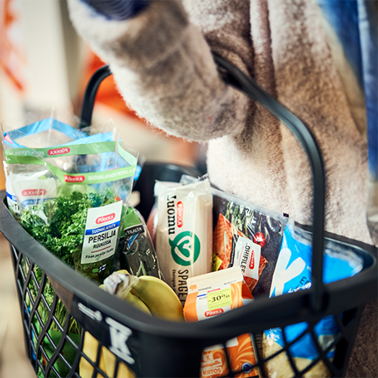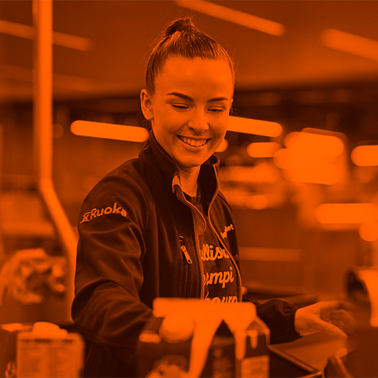Finland is lagging behind in its achievement of the EU’s targets to reduce the use of plastic carrier bags and for recycling plastic. New measures are needed and both businesses and customers must be involved. Customers are being encouraged to reduce...

The coronavirus crisis put security of supply in the Finnish food chain to test
When the novel coronavirus hit Finland, the first reaction for many people was to stockpile food. This had more to do with a sense of security, as there was no reason to expect food shortages in Finland. Indeed, the Finnish food chain has held up well in the crisis, underpinned by various factors.
Finland has long traditions when it comes to ensuring food availability and security of supply in the food chain. Both the government and companies in the food sector actively uphold these traditions.
According to Ari Akseli, President of K Group’s grocery trade division, many of K Group’s strategic choices support security of supply: “First and foremost is our emphasis on Finnish food: it is a value choice for us, as is ensuring the vitality of Finnish food production. We’ve always seen a connection between K Group and its main country of operation: Finland’s success is our success.”
Finnish food accounts for a very significant share of products sold in K Group’s grocery stores, and nearly 100% of the bread, meat and dairy products sold come from Finland. Finns overall value food that comes from Finland: Finland’s food self-sufficiency rate is 80%, compared to some 50% in the neighbouring Sweden.
Potential challenges in obtaining food from abroad during the coronavirus crisis are expected to cause many countries to invest more in their own food production going forward.
“I believe that the coronavirus crisis will only increase consumers’ appreciation for Finnish food. In the longer term, we may even see production relocating closer, to Finland and Europe,” says Ari Akseli.
Security of supply in the Finnish food chain is based on voluntary cooperation
A key operator for security of supply in the Finnish food chain is the Emergency Preparedness Retail and Distribution Pool, which operates under the National Emergency Supply Agency (NESA), and is headed by the Finnish Grocery Trade Association.
“Our task is to ensure the nationwide availability of groceries under all circumstances,” says Lauri Kulonen, Emergency Preparedness Manager for the pool.
In practice, this means ensuring good collaboration between stores and other food chain operators, and helping the parties prepare for crisis scenarios. The pool also ensures the flow of information between authorities and businesses. This means that when store shelves start to look empty, K Group and other grocery store chains use the pool to inform NESA of the shortages, and the agency then informs ministry officials.
“Everything is based on a strong sense of trust between the participants, as the companies are handing over confidential business information. In return, the pool must create added value to the businesses,” explains Kulonen.
Added value includes the high-quality training provided by the pool, which helps companies in continuity management. There are also shared crisis exercises: companies in the Finnish food sector last carried out a pandemic-related exercise in 2018. Such exercises help, for example, to identify critical functions.
Participation in the Emergency Preparedness Retail and Distribution Pool is voluntary for the companies. K Group’s experiences are positive, and the pool is part of the Group’s preparedness strategy. According to Lauri Kulonen, the voluntary pool works because companies feel they gain something from the cooperation.
“Our objective is to organise things effectively without the need for authority regulations. During the coronavirus crisis, the excellent collaboration between the businesses has been tangible,” says Kulonen.
Ari Akseli also praises the excellent – and entirely voluntary – cooperation between different operators during the crisis.
“We have both followed official guidelines and instructions and proactively carried out our own additional safety measures at the stores, including installing protective shields at checkouts, making hand sanitiser readily available, and offering dedicated shopping times for people most at risk. Responsible retailers act wisely and preferably proactively,” says Akseli.
K Group offers a nationwide network of grocery stores
Finland is geographically a long country with some sparsely populated areas. Local grocery stores are vital in ensuring people in such areas also have good access to groceries. The even distribution of stores across the country is crucial for K Group’s security of supply.
“Actually, most Finns live surprisingly close to a grocery store, on average only 1.5 kilometres away. We at K Group have always been proud of our store network, which is the most extensive in country,” notes Ari Akseli.
However, during the epidemic, even visits to the local store have become too risky for many people. This has caused the popularity of online grocery shopping to skyrocket. Many retailers have reacted quickly, introducing various new grocery pick-up and delivery services. Finland has taken a major digital leap: although online grocery sales have been on the rise for many years, during the crisis growth has been astounding, peaking at 900%. Some 15 new K Group grocery stores have been added to the online sales network every week.
“Online growth has also been boosted by the fact that Finns are well-equipped to adopt new digital services,” notes Akseli.
K Group has benefitted from its agile retailer business model, which according to Akseli, has enabled K-stores to experiment and carry out changes flexibly. During the crisis, this has proven an effective way to develop new ways of operating: “For example, many stores quickly began collaborating with local restaurants. Independent retailers can also easily make changes to their selections, for example, by adding products by local small producers.”
The epidemic has also meant exceptional operating circumstances for K Group’s logistics. Additional storage space has been obtained, and load size and delivery numbers increased. According to Ari Akseli, K Group has managed to make everything run smoothly, while also gaining valuable lessons for the future: “After the crisis, we can evaluate the main things we have learned and assess what needs to be changed.”
 YES
YES
 NO
NO











